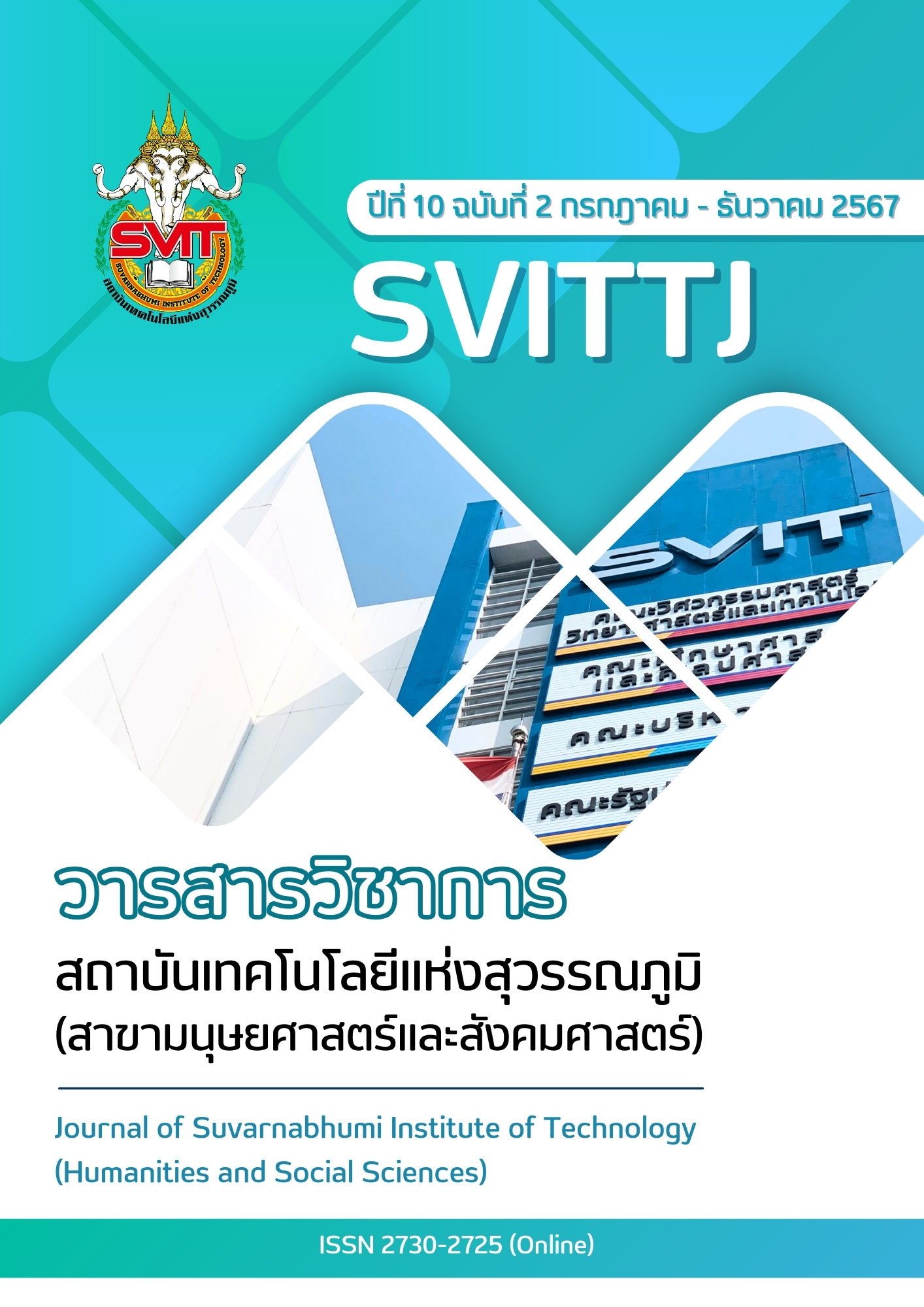ENHANCING JOB SATISFACTION OF UNIVERSITY TEACHERS IN SICHUAN, CHINA
Keywords:
Teacher Job Satisfaction, Influencing Factors, Strategic PlanAbstract
This study aims to investigate factors impacting principal's transformational leadership, principal's transactional leadership, teamwork, training and development, and self-efficacy on teacher job satisfaction. The study used the item-objective congruence (IOC) index as validity and Cronbach's alpha (n=30) as reliability. The 80 valid questionnaires from Sichuan University of Science & Engineering were analyzed using multiple linear regression to verify the significant relationships among the variables. Subsequently, 30 teachers were selected to attend the strategic plan over 14 weeks. Then, paired samples t-tests were conducted to compare the quantitative results of post-strategic and pre-strategic planning. In a multiple linear regression study, the results line principal's transformational leadership, principal's transactional leadership, teamwork, training and development, and self-efficacy are five variables that have a significant effect on teachers' job satisfaction. Finally, the paired samples t-test showed a significant difference between the post-strategic plan stage and the pre-strategic plan stage in terms of teachers' job satisfaction. This study aims to improve teachers' job satisfaction regarding principals' leadership, teamwork, training and development, and self-efficacy to stabilize the teaching force and improve the overall quality of school operations.
References
Adair, J. (1986). Effective team-building (1st ed.). Gower.
Appiah, K. O., Boamah, G. K., Baryeh, D. O., Browne, N., Ferkah, A. T., & MarkuAerdu, T. (2013). Views of employees on training and development: A case study of opportunity international savings and loans. International Online Journal, 1(2), 1-199.
Bandura, A. (1977). Self-efficacy: toward a unifying theory of behavioral change. Psychological review, 84(2), 191-215. https://doi.org/10.1037/0033-295x.84.2.191
Bandura, A. (1994). Self-Efficacy. In V. S. Ramachaudran (Ed.), Encyclopedia of Human Behavior (Vol. 4, pp. 71-81). Academic Press.
Biggerstaff, J. K. (2012). The relationship between teacher perceptions of elementary school principal leadership style and teacher job satisfaction. [Doctoral Dissertation, Western Kentucky University].
Bogler, R. (2001). The influence of leadership style on teacher job satisfaction. Educational administration quarterly, 37(5), 662-683. https://doi.org/10.1177/00131610121969460
Burns, J. M. (1978). Leadership (1st ed.). Harper and Row.
Elnaga, A., & Imran, A. (2013). The effect of training on employee performance. European journal of Business and Management, 5(4), 137-147.
Glaveli, N., Vouzas, F., & Roumeliotou, M. (2022). The soft side of TQM and teachers job satisfaction: an empirical investigation in primary and secondary education. The TQM Journal, 34(5), 922-938. https://doi.org/10.1108/tqm-11-2020-0269
Hackman, J. R., & Wageman, R. (1995). Total quality management: Empirical, conceptual, and practical issues. Administrative science quarterly, 40(2), 309-342. https://doi.org/10.2307/2393640
Jehanzeb, K., & Bashir, N. A. (2013). Training and development program and its benefits to employee and organization: A conceptual study. European Journal of business and management, 5(2), 243-252.
Kalisch, B. J., & Lee, H. (2009). Nursing teamwork, staff characteristics, work schedules, and staffing. Health care management review, 34(4), 323-333. https://doi.org/10.1097/hmr.0b013e3181aaa920
Kanungo, R. N. (2001). Ethical values of transactional and transformational leaders. Canadian Journal of Administrative Sciences/Revue Canadienne des Sciences de l'Administration, 18(4), 257-265. https://doi.org/10.1111/j.1936-4490.2001.tb00261.x
Leithwood, K., & Jantzi, D. (2005). Transformational leadership. The essentials of school leadership, 31, 37-52. https://doi.org/10.4135/9781446288290.n3
Nassazi, N. (2013). Effects of training on employee performance: Evidence from Uganda [Unpublished doctoral dissertation. University of Applied Sciences, Vassa, Finland].
Nunnally, J. C., & Bernstein, I. H. (1994). Psychometric theory (3rd ed.). McGraw-Hill.
Oliver, R. E. (2008). Relationship between teacher job satisfaction and teaming structure at the middle school level [Doctoral dissertation, University of Kansas].
Ortan, F., Simut, C., & Simut, R. (2021). Self-efficacy, job satisfaction and teacher well-being in the K-12 educational system. International journal of environmental research and public health, 18(23), 12763. https://doi.org/10.3390/ijerph182312763
Pillai, R., Schriesheim, C. A., & Williams, E. S. (1999). Fairness perceptions and trust as mediators for transformational and transactional leadership: A two-sample study. Journal of management, 25(6), 897-933. https://doi.org/10.1177/014920639902500606
Randelangi, A., Kamaluddin, M., Sukotjo, E., Palilati, A., & Suleman, N. R. (2022). The influence of leadership style, teamwork, and organizational learning on performance through job satisfaction of state vocational school teachers. World Journal of Advanced Research and Reviews, 16(2), 89-100.
Salas, E., Dickinson, T. L., Converse, S. A., & Tannenbaum, S. I. (1992). Toward an understanding of team performance and training. In R. W. Swezey & E. Salas (Eds.), Teams: Their Training and Performance (pp. 3-29). Ablex.
Sergiovanni, T. J. (1990). Adding value to leadership gets extraordinary results. Educational leadership, 47(8), 23-27.
Skaalvik, E. M., & Skaalvik, S. (2014). Teacher self-efficacy and perceived autonomy: Relations with teacher engagement, job satisfaction, and emotional exhaustion. Psychological reports, 114(1), 68-77. https://doi.org/10.2466/14.02.pr0.114k14w0
Tschannen-Moran, M., & Hoy, A. W. (2001). Teacher efficacy: Capturing an elusive construct. Teaching and teacher education, 17(7), 783-805. https://doi.org/10.1016/s0742-051x(01)00036-1
Vongurai, R. (2022). Key Drivers of Operational Performance of E-commerce Distribution Service Providers in Thailand. Journal of Distribution Science, 20(12), 89–98. https://doi.org/10.15722/jds.20.12.202212.89
Zembylas, M., & Papanastasiou, E. (2004). Job satisfaction among school teachers in Cyprus. Journal of Educational Administration, 42(3), 357-374. https://doi.org/10.1108/09578230410534676
Downloads
Published
Issue
Section
License
Copyright (c) 2024 Suvarnabhumi Institute of Technology

This work is licensed under a Creative Commons Attribution-NonCommercial-NoDerivatives 4.0 International License.
บทความที่ได้รับการตีพิมพ์เป็นลิขสิทธิ์ของวารสาร Sarasas Journal of Humanities and Social Science ข้อความที่ปรากฏในบทความแต่ละเรื่องในวารสารวิชาการเล่มนี้เป็นความคิดเห็นส่วนตัวของผู้เขียนแต่ละท่านไม่เกี่ยวข้องกับสถาบันสารสาสน์เทคโนโลยีแห่งสุวรรณภูมิแต่อย่างใด ความรับผิดชอบองค์ประกอบทั้งหมดของบทความแต่ละเรื่องเป็นของผู้เขียนแต่ละท่าน หากมีความผิดพลาดใดๆ ผู้เขียนแต่ละท่านจะรับผิดชอบบทความของตนเองแต่ผู้เดียว



